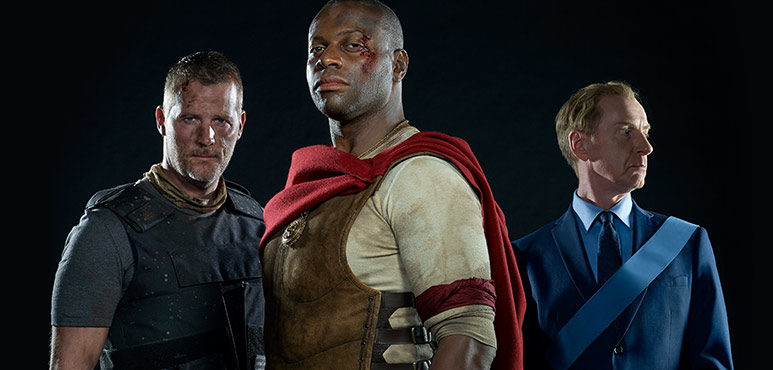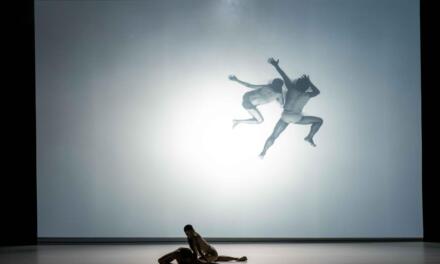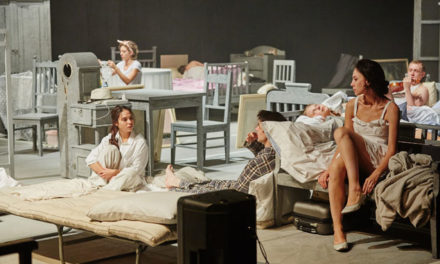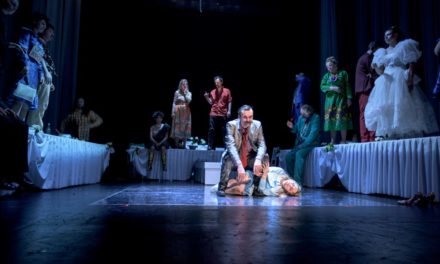We’re not in a movie house. We’re in Robert Lepage country, so it’s inevitable that the famed Quebec director will be putting his own unique imprint on Shakespeare’s dark and brooding drama about a rough-hewn military hero brought down because of his contempt for the “rank-scented” multitudes who once venerated him. Lepage has brought along his own Ex Machina team to assist him in introducing festival audiences to his trademark fusion of technology and art, and the result is riveting.
Lepage’s arrival at Stratford is long overdue, and although his status as a brilliant performance artist seems more secure than his reputation as a classical director, the narrative excitement he extracts from a problematic play like Coriolanus is sufficient to erase memories of the deplorable Midsummer Night’s Dream that he inflicted on the National Theatre of Great Britain several years ago.
The Avon Theatre’s proscenium stage is his vessel—on this occasion, a blank expanse onto which individual scenes, framed in various shapes and sizes, slide in and out of view. Here, there, and everywhere, they’re a model of slick, high-definition exhibitionism.
Call it smoke and mirrors, if you like. Admit that this approach leads to emotional coldness. Nevertheless, in his own inimitable way, Lepage is exercising his authority over a play that can easily veer out of control psychologically and structurally. At one point in the text, Shakespeare comes up with a dizzying succession of brief scenes so fast and fleeting that you wonder whether they have any value at all. But Lepage brings them off brilliantly, turning them into vivid snapshots with point and substance. Tracking shots and fades—astonishing in live theatre—show a readiness to reach into a cinematic toolkit dating back to the silent era while also harnessing it to an effects technology that firmly belongs in the new millennium.
And where does this Coriolanus belong? We’re definitely not in the play’s original setting of 490 B.C. No, it’s phone-in time in a radio studio, with 24-hour news channels flickering away in the background. These are the portals through which we learn what’s been happening. That battle-scarred warrior, Caius Martius has fought so superbly against the Volscian enemy that he has been acclaimed as Rome’s savior, given the title of Coriolanus and emerges as a candidate for consulship of the city. But already divisiveness is in the air. Calls are coming in about Caius Martius’s arrogance—which is a cue for Tom McCamus, in the role of a suave studio guest named Meneneus, to start providing a bit of spin in defense of his beleaguered friend.
Lepage is thrusting us into a volatile world of contemporary politics—a world of spin, deal-making, and betrayal. And for Lepage, the social media at its most lethal serves as a contemporary stand-in for the Roman mobs that first worship Coriolanus and then want to tear him apart. He is also, most significantly offering a cautionary tale about the fragility of the democratic system.
Lepage and his team are delivering an engrossing evening of theatre here, but Coriolanus has always been a problem play—beginning with the fact that its title character is difficult to like. We do not warm to him. Coriolanus is planting the seeds of his own destruction with his massive ego and unyielding contempt for a citizenry that is ready to embrace his heroism and then sufficiently enraged that he must flee for his life. Nor does he then win much sympathy for striking an alliance with the Volscian leader, Tulius Aufidius, and laying siege to the city he once defended.
If the powerful performance of Andre Sills as Coriolanus keeps us off-balance and ambiguous about him, that’s all to the good. Indeed, if we ask ourselves who the “good guys” are in this play, we’re hard-pressed to give an answer. Some 40 years ago, the problems posed by this play were laid out by John Goodwin, at that time the head of publications for Britain’s National Theatre.
“There is room in Shakespeare’s text for stressing the rights of the people over their leaders, as there is for stressing exactly the opposite,” he noted with some perplexity.
Then there is the tragedy of Coriolanus himself—“a savior in war but an embarrassment in peace.”
A few days ago in Stratford, an American couple emerged from a performance rapturous over encountering a Shakespearean model for their own wonderful president, Donald Trump. Other playgoers will see such an interpretation as an improbable stretch, given Trump’s encouragement of the kind of mob psychology that Coriolanus despises. But the play has in fact been elastic in the way it can invite warring analyses and interpretations. In Victorian times, it was seen by some as a glorification of imperialism and by others as an indictment. In Paris, in 1933, the Comedie Francaise caused riots in the streets by depicting Coriolanus as an out-and-out hero. Then there was the contribution of Bertolt Brecht, an unrepentant Marxist: his Berliner Ensemble version reworked the play to assert the dogma that the leader is not indispensable.
Meanwhile, the play’s examination of mob psychology can be unsettling. Yes, the power of the mob can be for the good of the state, but it can also, when manipulated and driven by a herd mentality, can be devastating to democracy. Lepage, whose obsession with Coriolanus dates back to an earlier French-language version he mounted several years ago, is by no means complacent about the emergence of the social media as the prime instrument for mob action.
Lepage’s own views no doubt account for the sense of danger and unease running through this play. Uncertainty too: the volatility of Coriolanus can be as unsettling as the volatility of the people in the streets. And what of the backroom boys—the scheming tribunes like Junius Brutus and Siciunius Velutus? Where do they really stand?
Shakespeare’s text has been ruthlessly edited in the service of the production. It can be as cold and analytical as the Coen Brothers at their most impersonal, but it proceeds with impressive narrative clarity. Furthermore, the peculiar needs of this production are well served by a confident and responsive cast.
The Coriolanus that Andre Sills gives us is too rough-edged to represent “the clash of the aristocratic temper with the world.” That’s how John Masefield once famously defined this character, but Sills takes a different route. His Coriolanus may be consumed by privilege and an innate belief in his superiority over the common man, but he’s also a bruiser, rightly proud of his battlefield prowess but possessing neither the discipline nor the temperament to deal with affairs of state and observe the political niceties. Perhaps this Coriolanus, a smoldering bomb ready at any moment to explode, is too aggressive—but how much opportunity, really, does this play allow for shading? And perhaps, more plausibly, that aggressiveness may actually conceal fears and insecurity. Coriolanus’s relationship with his mother, played with possessive, maternalistic ferocity by Lucy Peacock, offers one glimpse into a troubled inner world. But there are also hints of a conflicted sexuality. What about the homoerotic undercurrents that occur during that impromptu wrestling match between Coriolanus and the Tulius Aufudius of Graham Abbey?
Abbey, very good as Coriolanus’s erstwhile adversary, excels in giving us both a complicated inner life and persuasively taking his character along an arc that leads to a blood-stained climax. Tom McCamus strikes a sardonic note as the loyal Menenius: those scenes where he nurses a drink at a trendy bar while shooting the breeze with those two conniving tribunes of the people, Junius Brutus and Sicinius Velutus, provide some of this show’s most entertaining moments. And as the tribunes, Stephen Ouimette and Tom Rooney, both terrific, are so pinched and weasel-like in their plotting that you wonder whose side they’re really on. Meanwhile, if you want a dose of integrity there’s always Michael Blake’s quietly compelling performance as the Roman general, Cominius.
And again and again, a strong narrative line is punctuated by moments that astonish. We watch the nose of a plane nudge into view on a wind-blown airfield. The sight of a child on his knees playing with war toys takes us onto an imaginary field of battle. Yes, we are often conscious of pieces being fitted neatly into place. But we’re watching Robert Lepage’s imagination at play here and it’s in the service of one of Shakespeare’s worthiest but trickiest plays. Bottom line: it’s one of the summer’s must-see shows.
(Coriolanus continues to October 20. Ticket information at STRATFORDFESTIVAL.CA or 1-800-567-1600)
This article originally appeared in Capital Critics’ Circle on June 30, 2018, and has been reposted with permission.
This post was written by the author in their personal capacity.The opinions expressed in this article are the author’s own and do not reflect the view of The Theatre Times, their staff or collaborators.
This post was written by Jamie Portman.
The views expressed here belong to the author and do not necessarily reflect our views and opinions.


















